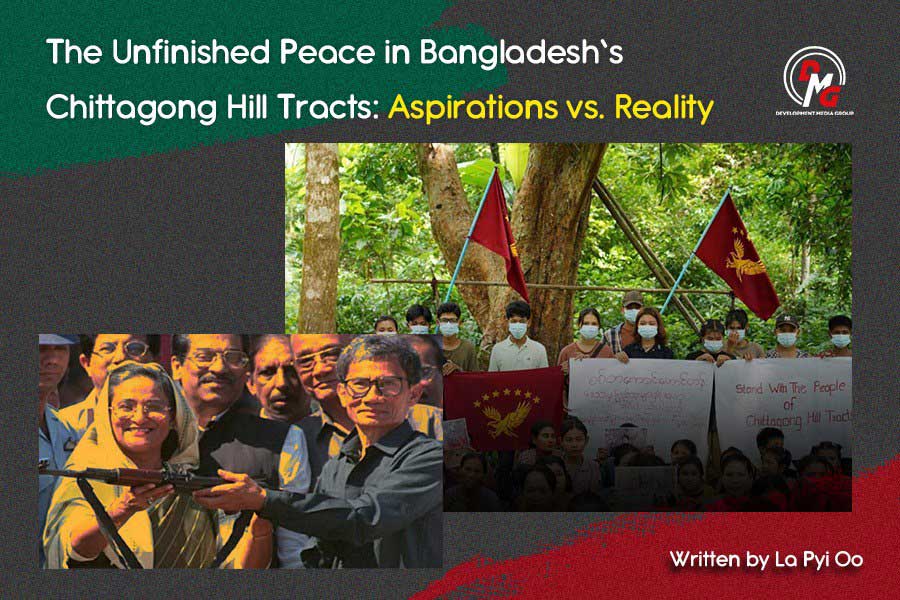- Over 200 IDPs in Ponnagyun struggle without shelter, food aid
- Junta airstrikes inflict deep psychological trauma on children in Arakan State
- Photo News: Over 200 IDPs in Ponnagyun in urgent need of shelter assistance
- Two children injured by UXO in Mrauk-U struggle to afford medical care
- High hepatitis cases hit children in Arakan State
The Unfinished Peace in Bangladesh's Chittagong Hill Tracts: Aspirations vs. Reality
Human-rights monitors are watching closely. Bangladesh already faces scrutiny at the UN over violence against indigenous groups. India New England+1 The sacking of the National Human Rights Commission by the Yunus government in November 2024 further worsened accountability gaps. The Tribune
05 Oct 2025

Written by La Pyi Oo
A recent rape case involving a Marma schoolgirl in Bangladesh's Chittagong Hill Tracts (CHT) has triggered large protests and a harsh security response. Indigenous communities and Bengali settlers clashed, and security forces opened fire - three civilians were reportedly killed, and many more injured. The violence has laid bare the structural vulnerabilities of indigenous minorities and questioned the state's ability to protect them.
A Tense Political Climate
Despite mounting calls for accountability, Prime Minister Dr. Yunus has remained silent on these events. Although his interim government vows national justice, its inaction on urgent rights violations in CHT intensifies doubts about whether the marginalized hill communities truly feature in its agenda.
At the same time, ethnic tensions in the region are spilling into new fronts. In late September 2025, the Bangladesh Army fired upon tribal residents in Guimara, Khagrachari, killing at least four and injuring more than 40, according to multiple reports. The Economic Times Local authorities claim these events are part of a broader conspiracy targeting communal stability. BSS Meanwhile, opposition figures such as BNP's Ruhul Kabir Rizvi have dismissed unrest in CHT as a politically motivated scheme orchestrated by national and international actors. Dhaka Tribune
Human-rights monitors are watching closely. Bangladesh already faces scrutiny at the UN over violence against indigenous groups. India New England+1 The sacking of the National Human Rights Commission by the Yunus government in November 2024 further worsened accountability gaps. The Tribune
Unfulfilled Promises of the Peace Accord
The 1997 CHT Peace Accord, signed between the PCJSS and the Bangladeshi state, had raised broad expectations: ethnic recognition of hill tribes, decentralized governance, withdrawal of temporary military camps, and resolution of land disputes. But decades later, many of its core provisions remain unfulfilled:
• The land commission, one of the most critical institutions to adjudicate property claims, has never been properly empowered or resourced.
• Dozens of "temporary" security camps remain active, preserving military influence over civilian life.
• Local policing structures remain under central or military control rather than community-based oversight.
• Bengal-origin settlers continue expanding into the hills, challenging natives' rights over land and resources.
Since 1947, Bengali settlers - once a tiny minority in the region - have grown significantly, altering demographics and pushing indigenous communities into shrinking margins. These demographic changes also reshape political power dynamics in the hills.
Militarization, Impunity & Ethnic Suppression
In addition to broken promises, state and military presence in CHT has grown rather than receded. Indigenous organizations argue that civilian governance has been overshadowed by armed and paramilitary forces. Orders like Operation Uttoran (the long-standing counterinsurgency operation in CHT) further centralize security control and often sideline local rights. Wikipedia
This militarized oversight contributes to a climate where abuses go unchecked. The recent rape case and resulting fire-fight deaths only intensify perceptions of impunity. By framing attacks as isolated settler actions or waiting for official investigation, the state risks deepening resentment.
Furthermore, the hill area's conflict is no longer peripheral to national politics. The 2024 student-led political upheaval in Bangladesh ushered in a government transition - one that has not quieted demands for justice, equality, and protections for minorities. Indigenous leaders are now more vocal in linking CHT violence to national struggles over identity, rights, and governance. The Guardian
What Must Be Done
1. Impartial justice now. The investigations into the Marma rape, killings, and injuries must be conducted transparently, independently, and swiftly. Without accountability, cycles of violence will only continue.
2. Visible political will. Prime Minister Yunus' government should publicly commit to protecting human rights in CHT and expediting implementation of the Peace Accord. Silence will only erode trust among hill communities.
3. A credible implementation roadmap. The state must adopt a firm timeline for core Accord provisions: a functioning land commission, phased withdrawal of camps, decentralization of policing, and protections for permanent hill residents.
4. Regulate settlement policies. The government should temporarily freeze further settlement in conflict-sensitive zones until land rights, demographic balances, and social trust are addressed.
5. Reconcile narratives. Both hills communities and Bengali settlers must be engaged in inclusive dialogue. Misinformation, hate speech, and historical grievances must be confronted openly to rebuild cohesion.
6. Independent monitoring and accountability. Domestic and global rights bodies must refocus on CHT. New evidence from the Guimara killings and widespread protests signals that intervention and documentation remain urgently needed.
If peace is to be more than a paper agreement in CHT, state power must be rebalanced - not toward repression, but toward justice, equality, and security for indigenous people. Otherwise, the hills will remain an unresolved fault line in Bangladesh's future.







.jpg)












